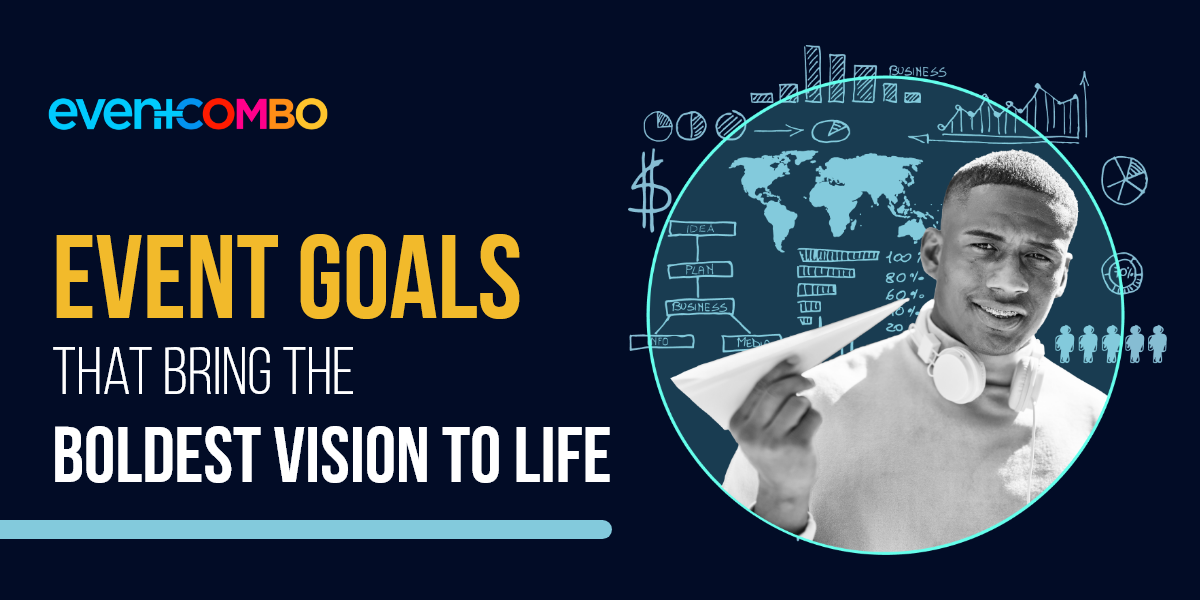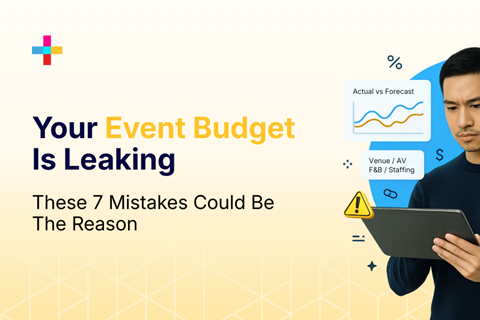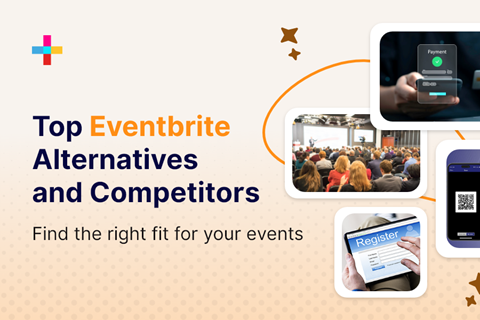

Event goals signify the purpose of your event, guiding your planning processes. They impact your decisions and consequently, the end results of your event efforts. Impactful event goals help you steadily build ROI by strengthening connection with your target audience, nurturing leads, and increasing brand awareness. According to a recent report by Research Dive, the global events industry will produce a revenue of $1,457.2 million by 2028! So, to maximize your revenues, identifying the right event goals is crucial.
Long-Term and Short-Term Event Goals
When gearing up for hosting any event, you should identify its purpose and how it will impact your organization in the long term. Short-term event goals are also known as objectives. These are specific actions you take during the planning process, such as increasing registrations, promoting the event on social media, or boosting ticket sales.
The activities you do to achieve event objectives keep you in the moment. Your thoughts do not go to how they will impact your brand in the long run. Clarity about it is also essential. That's why long-term smart event goals need to be identified.
Long-term event planning goals are essential because of the following reasons:
Meeting short and long-term goals can be challenging and requires a lot of consideration and thought. Embracing automation through Eventcombo's all-in-one event management software saves you time and eliminates manual tasks so you focus more on strategizing events that crush your goals.
How to Set Event Goals - Achieve Short-Term & Long-term Aims
Use these steps to set impactful event goals that prove successful in both the short and long run.
1. Understand Your Audience & Competition
No matter what kind of event you are planning, the goals must align with your target audience's needs. This is because your organization serves to solve the problems of its target audience. So, without knowing who your customers are, what do they want, and what they are trying to resolve, you cannot engage in event planning.
At the same time, assess what your competitors are doing. It's possible to uncover many meaningful strategies and activities to build your sway through events when you are aware of how your competitors are serving their customers. This step will help you identify your USP, target audience, ticket pricing strategies, and platforms for event promotion.
2. Align Yourself with the Needs of Stakeholders
Stakeholders influence your event in many ways. These people include sponsors, target guests, speakers, vendors, and even media. Thus, identifying them and their wants will allow you to communicate well and plan a memorable event. Note that the needs of different stakeholders are diverse. You may not be able to gauge them immediately. They will be revealed as you progress through the planning process. Nevertheless, mapping out the major stakeholder group is important to get things right from the beginning.
3. Consider Your Budget and Support Available
Budget constraints plague most event planners. If the goal-setting process is not according to your budget, it impacts the event experience and your long-term goals. The event goals change based on how much you can invest in various aspects of planning like venue selection, catering, decor, and more.
Besides budgetthe budget, take a close look at your team. The diversity of roles will impact your event objectives. If the team is smaller, each professional will have to cover at least two roles. This will impact your event objectives. Bigger teams usually assign each person one role or share a task or have multiple people sharing a particular work. This reduces the time that it takes to fulfill an objective.
Manage multiple venues, spaces, booking, and allocate resources efficiently with the venue management feature in our event management platform.
4. Set SMART Event Goals and KPIs
We have already defined the meaning of SMART goals. Here we'll make them clearer with examples.
1. Specific: Clearly define the goal.
Example: Increase event registration by 20% compared to last year.
2. Measurable: Ensure the goal can be tracked and measured.
Example: Use registration data from the event management platform to track the number of registrations.
3. Achievable: Set a realistic goal that can be accomplished with the resources available.
Example: Implement targeted social media campaigns and email marketing to attract more attendees.
4. Relevant: Ensure the goal aligns with broader business objectives.
Example: Boosting registration aligns with the company's goal to expand its market reach.
5. Time-bound: Set a deadline for achieving the goal.
Example: Achieve a 20% increase in registrations by the event date, three months from now.
Similar to SMART goals, SMART KPIs empower you to track and measure your event's success. Thus, you gain insights about whether you will achieve long-term event goals. Our event management solution lets you measure and track all the important KPIs in a centralized and easy-to-use dashboard.
The most important smart KPIs you should set, and track include:
A Roadmap with Examples of Short Term and Long Term Event Goals
The following roadmap will make the event goal-setting process clearer to you.
Short-Term Event Objectives (0-6 months)
Planning and Research
Time needed - 1 month
Objective: Conduct competitor research and understand the target audience.
Tasks:
Define Event Scope and Requirements
Time needed - 1 to 2 months
Objective: Outline event's purpose, theme, and key requirements.
Tasks:
Develop Marketing and Promotion Plan
Time needed - 2 to 3 months
Objective: Build a comprehensive marketing strategy for event promotion and awareness
Tasks:
Logistics and Operations Planning
Time - 3 to 4 months
Objective: Plan the logistics and operations for the event go seamlessly
Tasks:
Registration and Attendee Management
Time - 4 to 5 months
Objective: Streamline the registration process and manage attendee data.
Tasks:
Final Preparations and Rehearsals
Time - 5 to 6 months
Objective: Ensure that every aspect of the event is ready and conduct final rehearsals.
Tasks:
Long-Term Event Goals (6 months - 3 years)
Post-Event Evaluation and Feedback
Time - 0-1 month post-event
Goal: Gather feedback and analyze the event's success.
Tasks:
Build and Strengthen Relationships with Audience
Time - 1-6 months post-event
Goal: Develop long-term relationships with your attendees, sponsors, and partners.
Tasks:
Strategic Planning for Future Events
Time - 6-12 months
Goal: Develop a strategic plan for future events based on insights gained.
Tasks:
Continuous Improvement and Innovation
Time - 1-3 years
Goal: Continuously improve event quality and innovate to keep yourself ahead in the industry.
Tasks:
Brand Building and Market Expansion
Time - 1-3 years
Goal: Strengthen the event's brand and expand into new markets.
Tasks:
If you are planning a company-wide event, this corporate event planning checklist will help you set crystal clear objectives.
Ready to Set & Meet Your Event Goals?
Clearly defined event goals and objectives set your event planning for success. You don't want to shoot arrows in the dark and leave most things to circumstances. Setting up impactful event goals hands you the power to build a successful trajectory for your brand. Assign different tasks to different teams but ensure that everyone feels united when it comes to the goals.
And while you are working hard to achieve your objectives and vision, use event technology to make your life easier. Eventcombo's feature-rich event management platform will complement your efforts by improving customer service, increasing operational efficiency, and optimizing resource usage. Check it out here.

Every event organizer knows the sinking feeling of watching a well-planned budget unravel. That initial estimate of $400,000 suddenly balloons to $540,000 due to unexpected fees and overlooked expenses.

Eventbrite is a common name in the event management space, but if you’re here, chances are it isn’t checking all your boxes. Like many professionals, you may be looking for Eventbrite alternatives or exploring...

Networking events remain the backbone of professional growth, whether you're building a business, recruiting talent, generating leads, or seeking strategic partnerships.